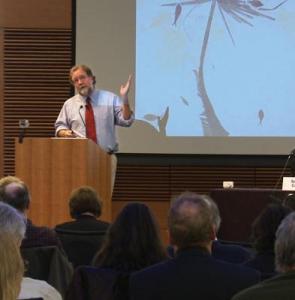By Emily Eggleston
Sean Carroll’s discussion on the denial of evolution and other scientific concepts so piqued conference-goers’ interest that they were willing keep the discussion going 25 minutes into their lunch break.
Carroll, a UW-Madison geneticist and vice president for science education at Howard Hughes Medical Institute, presented six categories of argument that make up what he called “A general manual of denialism” (see sidebar, page 3). He extracted the six categories from an article describing arguments specific to anti-vaccination but that can be broadly applied to many issues of denial.
Dealing with these six categories of argument is where we are now in confronting denial of science, Carroll told the audience. The question is, he said, “where do we go?” For example, where do we go when we know that a significant percentage of the country will be completely deaf to the progress of evolutionary science? While he hesitated to offer a “cure” to denialism, he said that doing nothing is unacceptable.Carroll, the Allan Wilson Professor of Molecular Biology and Genetics at the University of Wisconsin-Madison, said the way to counter denialism is to tell the story of science in a more compelling way. Science lends itself to a narrative and people remember stories more than they remember other types of information. To support his storytelling approach, Carroll discussed narrative theory’s relationship to cognitive psychology. Human thought, he said, is fundamentally structured around stories and people use narratives to understand cause and effect over time. The most powerful part of a story is that listeners become immersed in the information you are trying to tell. In a great story, they share motivations and emotions of the protagonist. He suggested writers should use the power of storytelling to convey the conclusions of science.
In his position at the Howard Hughes Medical Institute, Carroll helps make 10- to 12-minute videos with stories illustrating science concepts for K-12 students. He showed one of the videos, which demonstrated how a favorable genetic mutation can lead to the evolution to an animal population.
“I know how to reach under 18 (year-olds) where they are captive — in the classroom,” he told the room. “Four million of them become voters each year. Within a decade that’s 40 million new voters.”
If you can reach a population with compelling scientific evidence at an age when they are forming opinions, Carroll thinks the political discussions among the electorate may slowly change.
Carroll’s six arguments — especially the last one, which stated science challenges the fundamental ideologies of denialists — ignited a round of discussion by the panel and questions from the audience that could have lasted for hours. The panel included Robin Marantz Henig, contributing writer to The New York Times Magazine; Dan Fagin, director of the health science and environmental reporting program at New York University; and Cristine Russell, a contributing editor to Atlantic.com.
Emily Eggleston is a student at the University of Wisconsin-Madison. Video of Carroll's session can be viewed at the conference web site




